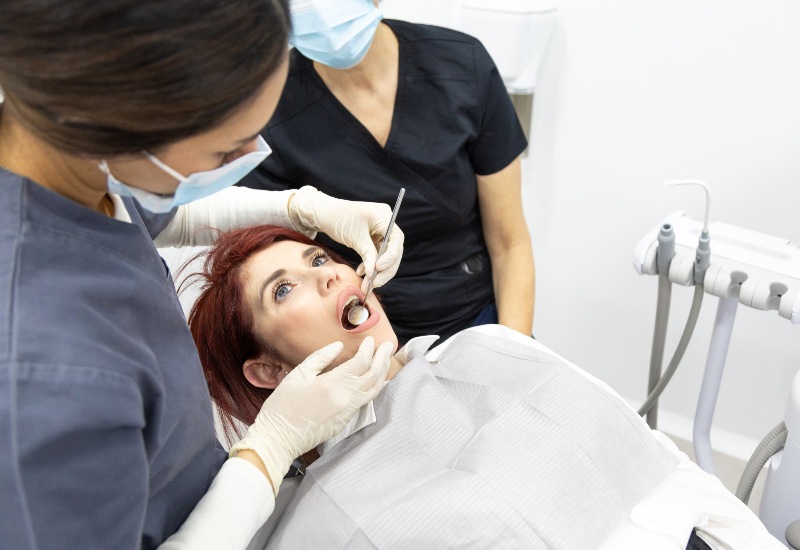Everything You Need to Know About Oral Hygiene and Prevention
Good oral hygiene is the foundation of a healthy smile. For patients in Antioch, IL, practicing consistent dental care at home and scheduling regular preventive dentistry visits can help reduce the risk of cavities, gum disease, and other oral health concerns. By understanding the importance of oral hygiene and adopting tips for daily dental care, you’ll protect both your smile and your overall well-being.
What Is Oral Hygiene?
Oral hygiene refers to the daily and professional practices that keep your mouth clean and healthy. It combines habits like brushing and flossing with preventive dental care, such as routine cleanings and checkups. When maintained properly, oral hygiene reduces harmful bacteria, prevents gum disease, and helps preserve natural teeth for life.

The Basics of Oral Hygiene
Strong oral hygiene starts with everyday habits. These are the essential practices every patient should follow to keep their mouth healthy:
- Brush teeth twice daily with fluoride toothpaste
- Floss at least once daily to clean between teeth
- Replace your toothbrush every three to four months
- Rinse with an antimicrobial mouthwash to reduce bacteria
- Maintain a balanced diet low in sugary snacks and drinks
Preventive Measures for a Healthy Smile
Preventive dentistry goes beyond daily brushing and flossing. It includes treatments and services that stop problems before they become serious. Key preventive dental care steps include:
- Regular Dental Checkups – Exams and professional cleanings every six months support cavity prevention and gum disease control.
- Fluoride Treatments – Strengthen enamel and reduce the risk of decay.
- Dental Sealants – Protective coatings that shield molars from cavities.
- Oral Cancer Screenings – Early detection increases successful treatment outcomes.
- Customized Treatment Plans – Personalized care helps patients with higher risks of decay or gum disease.
Common Oral Hygiene Mistakes to Avoid
Even with good intentions, many people develop habits that hurt their dental health. Avoiding these mistakes will strengthen your oral hygiene routine:
- Brushing too hard and damaging enamel
- Skipping flossing or only flossing occasionally
- Ignoring the tongue when brushing
- Snacking frequently on sugary foods and drinks
- Delaying dental checkups until problems develop
The Link Between Oral Health & Overall Health
The importance of oral hygiene goes beyond your teeth and gums. Research shows strong connections between oral health and systemic health. Maintaining preventive dental care not only protects your smile but also contributes to better health throughout the body. Poor oral hygiene has been linked to conditions such as:
- Heart disease
- Diabetes complications
- Respiratory infections
- Pregnancy complications
Oral Hygiene Tips for Different Age Groups
Dental hygiene needs change throughout life. Here are practical tips for daily dental care at different stages:
- Teens & Young Adults – Focus on consistent brushing and flossing while limiting sugary drinks and tobacco use.
- Adults – Stay on top of regular checkups and address early signs of gum disease.
- Older Adults – Watch for dry mouth from medications and keep dentures or bridges clean.
Signs You Need to Improve Your Oral Hygiene
Sometimes your mouth will signal that changes are needed. Be alert to these common signs that your dental care routine could be improved:
- Persistent bad breath
- Bleeding gums when brushing or flossing
- Tooth sensitivity to hot or cold
- Build-up of tartar or plaque
- Frequent cavities or gum inflammation
Advanced Preventive Care Options
In addition to daily habits and routine visits, your dentist may recommend advanced options for preventive dentistry. These can provide added protection and long-term support for your oral health:
- Periodontal therapy for gum disease prevention
- Night guards to prevent wearing from teeth grinding
- Custom fluoride trays for patients at higher risk of decay
- Diagnostic imaging to monitor bone and tooth health
- Lifestyle counseling for tobacco cessation and diet improvement
Protecting Your Smile for the Future
Oral hygiene is more than a routine—it’s an investment in your long-term health. By committing to preventive dentistry, scheduling regular checkups, and practicing strong habits at home, you can avoid many common dental problems and keep your smile strong for years to come.
If you’re looking for guidance on preventive dental care in Antioch, IL, the team at Antioch Advanced Dentistry is here to help. Schedule your next dental checkup today and take the next step toward a healthier smile.
Oral Hygiene & Prevention FAQ
Patients often have questions about maintaining oral hygiene and the role of preventive dental care. Here are answers to common concerns related to dental checkup importance:
What Is the Importance of Oral Hygiene?
Oral hygiene keeps teeth and gums healthy, prevents cavities, and reduces the risk of gum disease, which is linked to overall health conditions.
How Often Should I Schedule Dental Checkups?
Most patients should see their dentist every six months, though some may need more frequent visits depending on their oral health.
What Are the Best Dental Hygiene Tips for Home Care?
Brush twice daily, floss once daily, replace your toothbrush regularly, and limit sugar intake for stronger oral health.
Why Is Gum Disease Prevention So Important?
Gum disease can lead to tooth loss and has been linked to serious conditions like heart disease and diabetes if left untreated.
What Preventive Dentistry Services Are Most Effective?
Fluoride treatments, sealants, and professional cleanings are highly effective preventive measures against decay and gum disease.
What Are Signs That I Need Better Oral Hygiene?
Bad breath, bleeding gums, tartar build-up, and frequent cavities may indicate the need for improved dental care.
How Do Daily Habits Affect Oral Health?
Snacking on sugary foods, smoking, or skipping flossing all increase the risk of cavities and gum problems.
Is Preventive Dental Care Cost-Effective?
Yes. Preventive treatments are generally less expensive and less invasive than restorative care needed for untreated problems.
